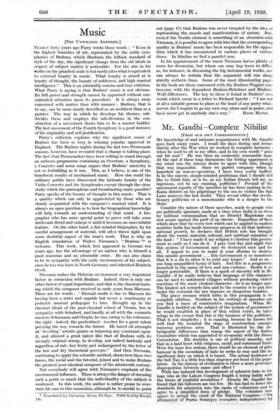Music
• - [THE UNWILLING ANTIPOPE.] •
NEARLY forty years ago Parry wrote these words : " Even in the highest branches of art, represented by the noble sym- phonies of Brahms, which illustrate the loftiest standard of style of the day, the significant change from the old ideals in respect of subject matter is noticeable. For the aim in his works on the grandest scale is but rarely after what is equivalent to external beauty in music. What beauty is aimed at is beauty of thought, the beauty of nobleness, and high musical intelligence." This is an admirably concise and true criticism. What Parry is saying is that Brahms' music is not obvious. Its full power and strength cannot be appraised without con- centrated attention upon its procedure. It is always More concerned with matter than with manner ; Brahms, that is to say, can be more nearly described as an architect than as a painter. The way in which he develops his themes, sub- divides them and employs the sub-divisions in the con- struction of a movement shmis him to be a master builder. The last movement of the Fourth Symphony is a good instance of his originality and self-justification.
• Parry's criticism explains why the significant music of Brahms has been so long in winning popular approval in England. The Brahms nights during the last two Promenade seasons, however, have revealed that a change is taking place. The fact that Promenaders have been willing to stand through an arduous programme containing an Overture, a Symphony, a Concerto and some songs argues that Brahms' austerity is not so forbidding as it was. This, as I believe, is one of the beneficent results of mechanized music. How else could the ordinary public have discovered the intimate beauty of the Violin Concerto and the Symphonies except through the close study which the gramophone and broadcasting make possible? Parry speaks of the beauty of thought in this music. That is a quality which can only be appreciated by those who are closely acquainted with the composer's musical mind. It is always an open question as to how far biographical knowledge will help towards an understanding of that mind. A bio- grapher who has some special point to prove will take some irrelevant detail and enlarge it until it becomes an unavoidable feature. On the other hand; a fair minded biographer, by his careful arrangement of material, will often throw light upon some doubtful aspect of the man's work. That is why an English translation of Walter Niemann's " Brahms "* is welcome. This work, which first appeared in German ten years ago, has the advantage of an author who is himself a good musician and an admirable critic. He can also claim to be in sympathy with the early environment of his subject, since he too was born in North Germany and inherited Holstein blood.
Niemann makes the Holstein environment a very important factor in connexion with Brahms. Indeed, there is only one other factor of equal importance, and that is the classical train- ing which the composer received in early years from Marxsen. These are his words : "Eternal credit is due to Marxsen for having been a strict and capable but never a reactionary or pedantic musical pedagogue to him. Brought up in the classical ideals of the post-classical school of Vienna, less in sympathy with Schubert, and hardly at all with the romantic masters Schumann and Chopin, he was, owing to his tolerance, the right—indeed, the predestined—teacher for a great talent pointing the way towards the future. He hated all attempts at ' levelling ' artistic genius or imposing any constraint upon It, and allowed a great talent like that of Brahms with its strongly original stamp, to develop, not indeed lawlessly and regardless of rule, but freely and unhampered by the letter of the law and dry theoretical precepts." And then Niernann, continuing to apply the scientific method, shows how these two forces, the racial and the tutorial, joined and to make Brahms the greatest post-classical composer of the nineteenth century.
Not everybody will agree with Niemann's emphasis of the environment influence. There is always the danger of stressing such a point so much that the individuality of the subject is weakened. In this work, the author is rather prone to over- state his case in this connexion,although he Is careful to point * Translated by Catherine Alison Ph:1Iips.. ; .PubTiFted .13yRnepf, 18s. out (page 17) that Brahms was never tempted by the idea of representing the moods and manifestations of nature. But, even if the Nordic element is something of an obsession with Niemann, it is possible to agree with him that the corresponding quality in Brahms' music has been responsible for the oppos- ition which it has encountered in various places at various „ times. In Sibelius we find a parallel case.
In his appraisement of the music Niemann leaves plenty of room for discussion, but where one may beg leave to differ,- as, for instance, in discussing_ the big instrumental works, one can always be certain that the argument will run along strictly wsthetie lines. • Some of the most illuminating pages in the book are thoic concerned with the Brahms-Wagner con- troversy with the dependent Brahrns-Brilekner and rfraluni- Wolf. differences. The key to these is found in Brahms' own words which occur in a letter to Richard Specht : "I am not at all a suitable person to place at the head of any party what- soever, for I require to go my own way alone and in peace, and
have never got in anybody else's way." Baal" MAINE.










































 Previous page
Previous page